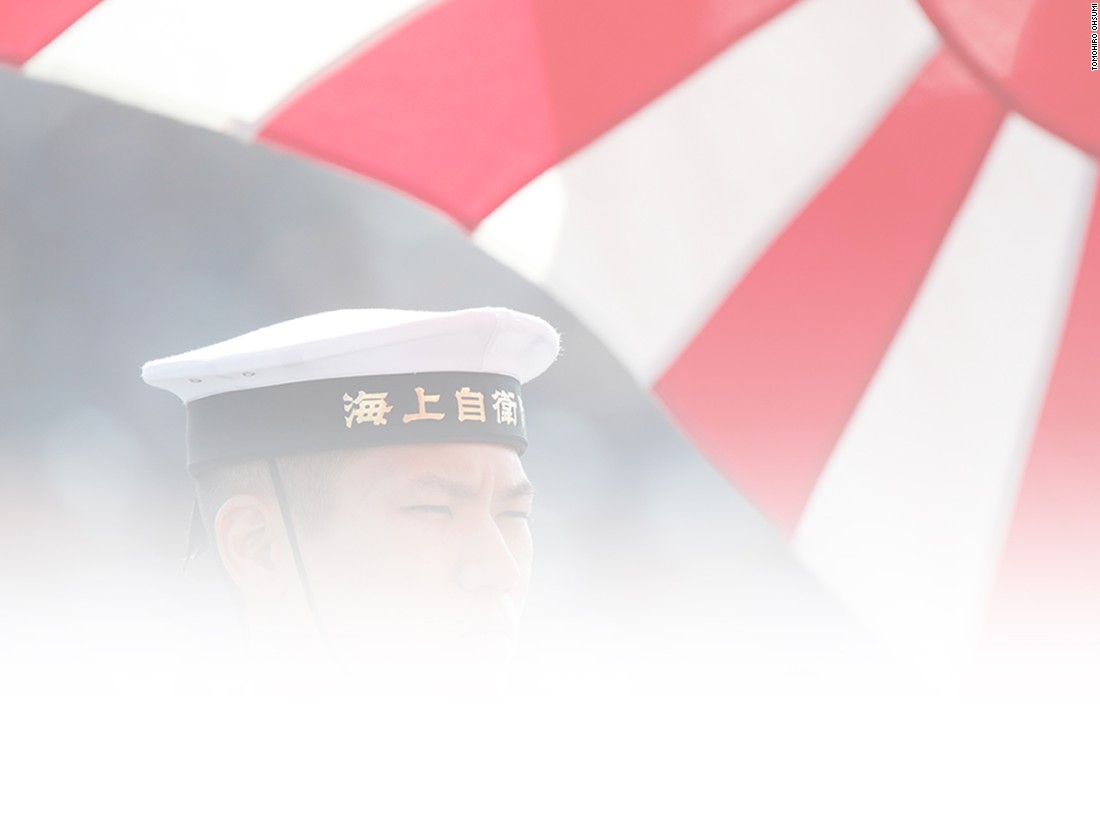
The future of US defense cooperation in Asia02:29
Resurgent Japan military 'can stand toe to toe with anybody'
Updated 1303 GMT (2103 HKT) December 7, 2016
(CNN)Seventy-five years after Japan unleashed one of the most devastating naval attacks in history on the US fleet at Pearl Harbor, the country has again established itself as one of the world's foremost military powers, experts say.
The resurgence comes despite a constitution imposed by the United States after World War II that limited the country's forces to defensive purposes only. In fact, analysts say, that defensive restriction has helped make Japan's military stronger than it might have been without it.
"Pilot for pilot, ship for ship, Japan can stand toe to toe with anybody," said John T. Kuehn, a professor of military history at the U.S. Army Command and General Staff College.
And it achieved this with a military budget that is only a fraction of others powers.
The buildup comes as the country faces shifting security dynamics in the region, with a newly elected US president who looks poised to upend the diplomatic playbook and redraw the geopolitical map.
The Japan-US alliance
Kuehn is not alone among analysts who rate Japan's navy, known as the Japanese Maritime Self-Defense Force, among the top five navies in the world.
Kyle Mizokami, editor of the Japan Security Watch blog and a contributor to US Naval Institute News, says it is Japan's alliance with the US that makes it such a formidable power in 2016.
"The United States and Japan are the two closest military powers in the world today. They're even closer than the US and UK," Mizokami said in an email to CNN.
"They train together on a daily basis, and there are major military exercises in air, land and sea on almost a weekly basis," Mizokami said.
Kuehn said the presence of US technology like the ship-based Aegis anti-missile system, which can shoot down ballistic missiles, in Japan's fleet makes it a force hard to counter.
"(Japan's) navy in alliance with the United States Navy makes for a winning combination in my mind," said Kuehn, a former US naval aviator and author of the book "A Military History of Japan: From the Age of the Samurai to the 21st Century."
The anti-war, US-imposed constitution Japan found itself under after World War II may have helped Japan put together a military that might be even stronger than the one that attacked Pearl Harbor on December 7, 1941, some analysts say, because Tokyo has only had to focus on defensive capabilities and not spend money on offensive ones.
Japan's submarine force is a prime example of how this has worked, Corey Wallace, Japan security analyst at Freie University in Berlin, said in an email to CNN.
"The Japanese government since the 1950s has carefully invested in its submarine program and basically perfected not only the technology but the procurement process," he said.
Unlike US Navy attack submarines, which carry missiles to attack land-based targets, Japan's strictly focus their attention at sea, allowing them to keep cost and complexity down.
From Mitsubishi to the military
Kuehn said the corporate culture of modern Japan also contributes to a stronger force.
"One team comes natural in Japan," he said, whereas in the US or other countries individuals are encouraged to stand out in the "Top Gun" mentality.
Kuehn said he wouldn't be surprised to see a weapons system like the F-35 Joint Strike Fighter, which was developed in the US and will eventually be made in quantity in Japan, be more successful in Japan than the US because Japan can take the best work of other countries and refine it to be even better.
He said he would expect the Japanese military to mirror Japanese manufacturers like Toyota or Mitsubishi and develop production, maintenance and tactical practices that would improve reliability and keep Japanese F-35s available for more missions than a typical US F-35.
"Well-trained, hard-working pilots with a corporate spirit flying the latest fourth- and fifth-generation aircraft. That can't be good news for (possible adversaries such as) Russia and China," Kuehn said.
Besides strong naval and air weaponry, Japan is making moves to improve its position in other areas, Mizokami said.
Foremost among those is amphibious operations, a form of warfare Japan invented with its storming ashore to conquer Pacific islands in the months after the Pearl Harbor attack, Mizokami said.
In fact, Japan in November completed a large exercise with US forces in the Northern Mariana Islands practicing just that.
Amphibious landings figure in to what Japan sees as its biggest security issues: Its competing claims with China over islands in the East China Sea, known as the Senkakus in Japan and the Diaoyus in China.
China pressed its claim to the islands in 2012 after Tokyo brought them under public ownership.
"I think it shocked Japan that (China) was willing to allow relations to deteriorate just to push its claim to a few small islands," Mizokami said.
Tokyo is developing an "amphibious rapid deployment brigade" of 3,000 troops, according the US Congressional Research Service.
"They're finally developing Marine infantry like the US Marine Corps, but only because they have several ... islands in the disputed region with China and are taking steps to take them back in the event of invasion," Mizokami said.
The South China Sea, where China has set up military installations on disputed islands, could prove another trouble spot for Japanese forces.
Japan's Defense Minister Tomomi Inada said in September the Self-Defense forces would increase activities there through joint patrols and exercises with the US and other regional navies.
Regional disputes like these could test the bedrock of Japan's military strength -- its alliance with the US.
Recent comments by President-elect Donald Trump and his team over Taiwan have angered China, and bring new friction to the region that could draw Japan into a conflict to support its ally in Washington.
Kuehn said Japan's Self-Defense Forces need to be careful not to "overreach" and move away from the strength they have developed protecting the home islands.
"The Japanese have figured out how to do business in Asia without controlling the real estate," which is what Japanese militarists tried and failed at in World War II, Kuehn said.
Authority to fire first
Even if it remains defense focused, Japan's military still can operate far from the country's coastlines. Japan's navy has the ability to move troops and hardware around the world, as evidenced by its role in UN peacekeeping.
That is a role that could get more fraught for Tokyo, as the country's legislature last month gave Japanese troops in hostile situations the authority to open fire first if threatened, something they have not done since World War II.
More than 300 Japanese troops are now in South Sudan, where ethnic civil war has been raging, as part of a United Nations peacekeeping force.
While it can't be predicted if or when Japan's troops could find themselves needing to use force, Mizokami says it's unlikely they'd be quick to pull the trigger.
"The Japanese military will defend themselves, but they're not spoiling for a fight," said Mizokami.
"No Japanese commander wants to be the first one to fire a shot in anger in more than 70 years."













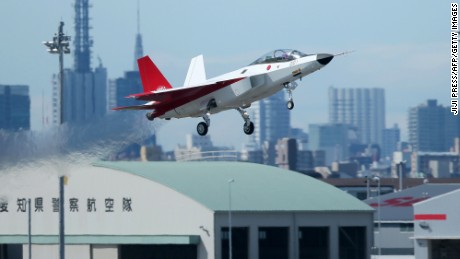









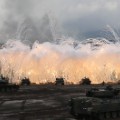
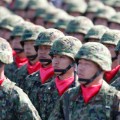
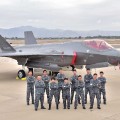
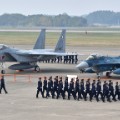

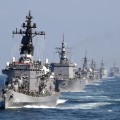
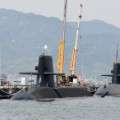
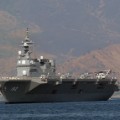
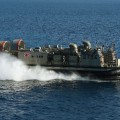
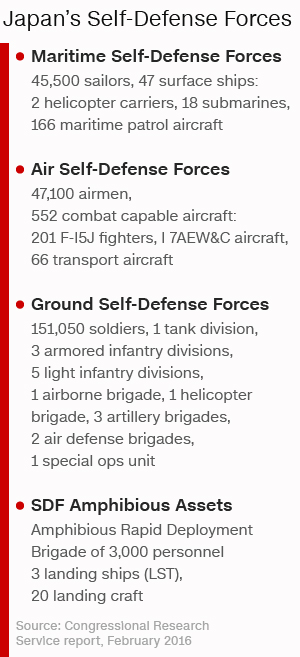
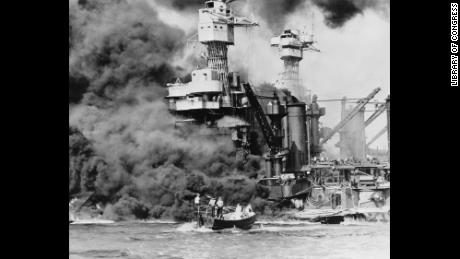
No comments:
Post a Comment